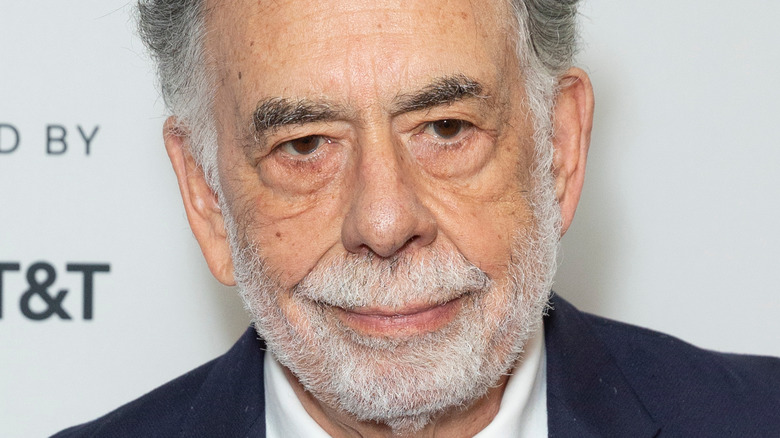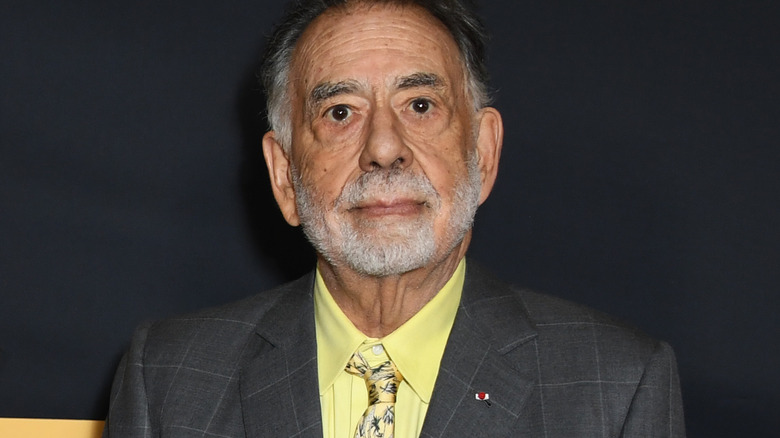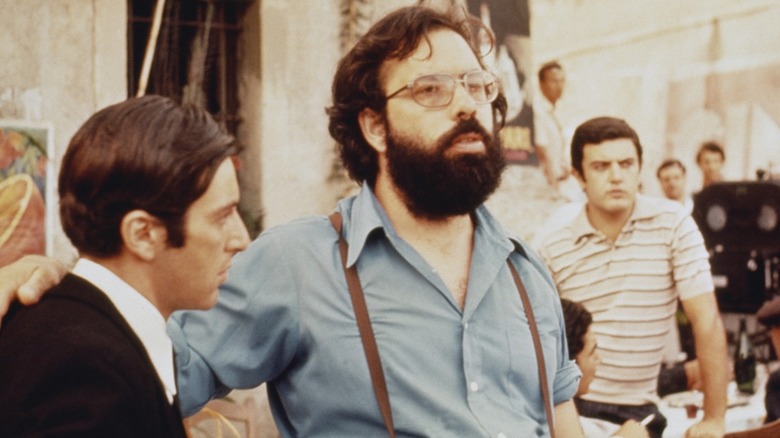Francis Ford Coppola Didn't Want To Direct The Godfather. Here's Why
There's no question that the legendary, 1972 Oscar-winning movie about the Corleone crime family, "The Godfather," defined filmmaker writer-director Francis Ford Coppola's career, but getting him to sign on to the picture wasn't exactly a slam dunk for Paramount Pictures.
Fans of the recent Paramount+ series "The Offer" got a unique inside look into the tumult that went into the making of "The Godfather," beginning with producer Al Ruddy's (Miles Teller) attempts to land the perfect director for the film. His pursuit led him to Coppola (Dan Fogler), who along with the author of "The Godfather" novel, Mario Puzo (Patrick Gallo), wrote what would become an Oscar-winning screenplay. What followed were a smattering of creative conflicts, which meant he and Ruddy would have to butt heads with Paramount studio boss Robert Evans (Matthew Goode). Further complicating things, Evans and the filmmakers had to clear all key decisions with Paramount's owner, Gulf+Western chief Charlie Bludhorn (Burn Gorman).
As dramatic as "The Offer" was, it was still a fictionalized version of what went into the making of "The Godfather." Peter Bart, who was a Paramount executive who worked with Evans on "The Godfather" — and currently writes a column for Deadline — disputes many of the events of "The Offer." In a column for the trade publication published a couple of weeks before the streaming series premiered in April 2022, Bart wrote that the "TV narrative about ['The Godfather's'] supposed production crises may ultimately be listed under the genre of science fiction."
Of course, while Bart disputes the series — which is based on the experiences of Ruddy making the film — Coppola has told his stories about the film over the years, too. Perhaps one of the most startling tales from the showbiz icon was that he originally wasn't interested in directing the film.
Coppola was cold to the idea of The Godfather because he wanted to make films like Fellini and Godard
In a 2009 appearance on "The Howard Stern Show," Coppola explained that he first wasn't interested in the film because of Puzo's source material, which in parts, he described for Stern and co-host Robin Quivers, was "sort of sleazy." Instead, Coppola wanted to make art films of a personal nature.
"In those days, when I was young, I wanted to be like, you know, [Federico] Fellini and write beautiful [stories] — [or Jean-Luc] Godard and be an artist," Coppola said. He added that since many major directors turned down Paramount to direct "The Godfather" because three previous gangster films in Hollywood were flops, the studio came to him because it was going to be produced without much of a budget. On top of that, Coppola, who was hot off a Best Adapted Screenplay Oscar win with Edmund H. North for "Patton" in 1971, believed that Paramount wanted to get a "free rewrite" of "The Godfather" script.
As it turned out, "The Godfather" was an offer Coppola couldn't refuse because of the financial state of his production company. He also didn't want to direct the mob movie because he was trying to get his mystery "The Conversation" made, even though as a young filmmaker, the odds were not in his favor.
Associates at Coppola's production company American Zoetrope, including future "Star Wars" writer-director George Lucas, told the filmmaker he needed to place commerce ahead of art. "They said, 'Francis, we gotta make some money. We're broke ... the sheriff is going to chain the door,'" Coppola recalled. "Do this book, you know this gangster book. Just do what they want and don't argue with them.'"
Coppola felt like he was going to be fired after getting hired
The irony for Coppola was, once he agreed to direct "The Godfather," his disagreements with the studio about who he should cast — especially in the lead role of the reluctant Godfather heir-apparent, Michael Corleone — made him feel like the job wouldn't last that long. "The rumor was I getting fired every week," Coppola told Stern. "They didn't like my casting because, you know, I had a lot of new actors that no one had ever heard of, [like] Al Pacino. We didn't have the money for stars, so we had to find the new kid ... they wanted Ryan O'Neal for Michael or [Robert] Redford, even."
Coppola ended up getting his way with the cast — and then some. He said that "The Godfather" was budgeted for about $3 million, but ultimately, he made the film for $6.5 million. While "The Godfather Part II" was equally as successful — the film, just like the first "Godfather," won the Oscar for Best Picture — Coppola admitted to Stern that he didn't want to direct that film either. Instead, he suggested to the studio that they hire another young filmmaker, a then-relative unknown director named Martin Scorsese. "He was, like, four years younger than me and they said, 'Who's he? No, no, no, no," Coppola said.
The director added that the main reason he wasn't interested in "The Godfather Part II" at first was that he didn't "believe that 'The Godfather' was the kind of story that could be serialized.'"
"I thought [the first film] was a drama and it over and that was the end, and Michael, you know, kind of corrupted himself and that was the story," Coppola told Stern.


